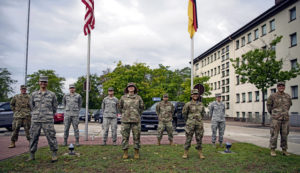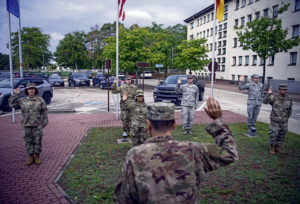
Several Airmen with experience and skills within the space domain officially transferred over from the U.S. Air Force to the U.S. Space Force, Sept. 1.
U.S. Space Force Col. James Quinn, U.S. Air Forces in Europe space forces director, gave the oath to six Airmen during a ceremony to officially usher them into the USSF.
“I’ve been in a space career field my entire U.S. Air Force career, so this just seemed like an easy transition,” said Master Sgt. Jennifer McCord, U.S. Air Forces in Europe plans and requirements space functional area manager. “I’ll be doing the same job, just within a new branch of our military.”
Airmen in complimentary career fields within the U.S. Air Force have voluntarily transferred services to help maximize personnel in the U.S. Space Force.
“I don’t think my role will change much, we still need leaders and experience,” McCord said. “Throughout my career there has been a push to create a space force, but to see it actually happen is amazing. Although members are just now transferring, I expect high levels of skill from our operators and will help to promote good qualities in them.”
Although the U.S. Space Force manifested less than a year ago, the U.S. Air Force has always considered space a vital part of air superiority.
“We’re fairly new and the culture in the space community has changed quite a bit, but innovation is still incredibly important,” said Capt. Justine Parr, 603rd Air Operations Center space weapons officer. “Our operators are very comfortable with newer technologies and it’s totally acceptable to always be pushing boundaries.”
The U.S. Space Force’s area of responsibility is currently any air space approximately 60 miles above the earth.

“I’ve been in the U.S. Air Force for 21 years and I was thinking about retiring, but now I’m going to stay in as long as I feel I’m being useful to this new service,” Parr said. “The possibilities are endless. The moon and deep space are within our area of responsibility. As newer technology comes online you’ll see the space force lead in innovation, embracing and finding a way to utilize these technologies to accomplish the mission.”
Satellites are a vital resource for the world economy. Whether in the civilian or military sector, the world’s key infrastructures, like the internet, global positioning systems and monetary transactions, depend on space assets.
“This is the first step in the right direction to ensure the world can continue to utilize the space effects that are provided on a daily basis,” Parr said. “The U.S. Space Force will preserve and ensure freedom of movement and the safety of the space assets.”


